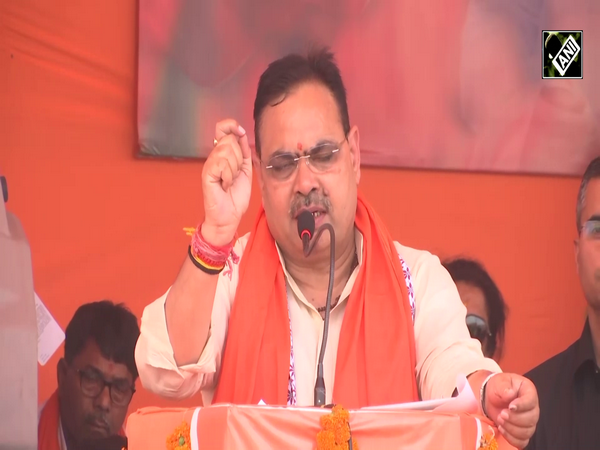Blue collar jobs to drive 70 pc of India's new job growth by 2030: Report
Apr 19, 2024

New Delhi [India], April 19 : Blue-collar workers, comprising over 80 per cent of India's non-agricultural workforce, play a pivotal role in driving and sustaining the country's economy across diverse sectors.
McKinsey & Company forecasts that by 2030, 70 per cent of the 90 million new jobs anticipated in India will fall under the category of blue-collar roles.
These positions constitute approximately 80 per cent of both organized and unorganized sector jobs in India, serving as the primary engine of the economy.
The fulfillment of these roles holds significant importance for the growth trajectories of sectors like manufacturing and logistics.
As of 2024, the hiring intent for non-white collar positions has experienced a 10 per cent increase compared to the previous year.
E-commerce is anticipated to witness the highest salary growth in 2024, projected at 10.9 per cent, followed by financial services with an expected growth rate of 10.1 per cent
Based on data from 2023, blue and grey-collar occupations contribute 1.25 per cent to India's Gross Domestic Product (GDP).
With their indispensable contributions to industries such as infrastructure, construction, transportation, and manufacturing, these workers form the bedrock of economic growth.
As India aims to achieve its developmental goals, empowering and upskilling this workforce emerges as a critical imperative.
Anshul Khurana, Co-founder and CEO of Entitled Solutions, shed light on the indispensable contributions of blue-collar workers to India's economy.
Khurana said, "Over 80 per cent of the workforce in India (excluding agricultural workers) is in blue and grey collar jobs, aggregating about 300 million workers."
The significance of blue-collar workers in India's economic landscape cannot be overstated.
Their labor fuels the wheels of growth in crucial sectors, generating employment opportunities and fostering industrial progress.
Amidst the nation's push towards expanding its manufacturing capabilities, the demand for skilled blue-collar workers has surged, underscoring their essential role in propelling overall economic advancement.
Khurana said, "Blue-collar workers form the bedrock of an economy, especially given that sectors that form large levers of growth (such as infrastructure, construction, transportation, etc.) for the economy depend on them. In a country the size of India, this is even more true, since a large proportion of employment generation happens in this segment."
He added, "As India tries to push towards its next phase by expanding its manufacturing capabilities, blue-collar jobs will become even more critical. The massive rise in demand (most indices show upwards of 40 per cent year-on-year demand for workers) for blue-collar workers over the past couple of years is proof of their contribution to overall economic growth. For India to become "Developed" by 2047, upskilling and empowering blue-collar workers will be one of the most critical parts of the puzzle."
Despite their indispensable contributions, many blue-collar workers in India remain underserved by traditional social security programs.
However, challenges persist in ensuring comprehensive welfare for this segment of the workforce.
Khurana said, "A small portion of blue-collar workers (who are qualified as full-time workers) are covered by traditional social security programs such as the Employees Provident Fund (EPF) and the Employees State Insurance Corporation (ESIC), but a large proportion of blue-collar workers, including new-age gig workers, daily wage earners, or contractual workers, are not covered by these schemes."
While some are covered by schemes like the Employees Provident Fund (EPF) and the Employees State Insurance Corporation (ESIC), a substantial proportion, including gig workers and daily wage earners, lack access to such benefits.
Khurana said, "There are sector-specific government programs, such as those for construction workers (registered under the Building and Other Construction Workers Act), that give them access to some health benefits, but these are administered by each individual state and are therefore non-standard and have many issues in terms of access."
Recognizing this gap, the government is undertaking initiatives such as the eShram database to extend social security coverage to unorganized workers.
"The government is now building a database of unorganized workers via eShram to hopefully bring some of these workers under social security", Khurana stated.
He further added, "There are also other national programs such as Pradhan Mantri Jan Arogya Yojana (PM-JAY) that are meant to enable health access for economically weaker sections, including blue-collar workers, but awareness of it is really low."
In parallel, digital innovation is reshaping urban finance and addressing the financial inclusion needs of the urban poor, particularly in the blue-collar sector.
Startups are leveraging technology to overcome barriers such as insufficient data, low digital literacy, and high user acquisition costs.
As India endeavors to propel its economy towards development, prioritizing the welfare and empowerment of blue-collar workers is paramount.
Government initiatives and innovative solutions from startups signify steps towards ensuring the inclusion and well-being of this crucial segment, essential for India's journey towards economic prosperity and social advancement.




















